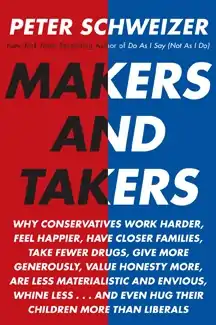Makers and Takers
Makers and Takers is a book by Peter Schweizer.[1] It was published by Doubleday in June 2008.[2] The book's thesis is summarized in its subtitle: Why conservatives work harder, feel happier, have closer families, take fewer drugs, give more generously, value honesty more, are less materialistic and envious, whine less … and even hug their children more than liberals.[3][4] Where Schweizer's book Do as I Say (Not as I Do): Profiles in Liberal Hypocrisy portrayed liberal icons and leaders in America as less virtuous than their conservative counterparts, Makers and Takers expands this thesis to the general populace, implying conservatives in general are more virtuous than liberals.[5]
 | |
| Author | Peter Schweizer |
|---|---|
| Subject | Liberalism, Conservatism |
| Publisher | Doubleday |
Publication date | June 3, 2008 |
| Pages | 272 |
| ISBN | 978-0-385-51350-0 |
| Preceded by | Do as I Say (Not as I Do) |
| Followed by | Clinton Cash |
References
- Kengor, Paul (16 June 2008). "Makers and Takers". Townhall. Retrieved 26 June 2016.
The following is an interview with Peter Schweizer, author of the newly released Makers and Takers (Doubleday, 2008).
- Doubleday (29 May 2008), Peter Schweizer’s Makers and Takers examines conservative/liberal divide and the ways in which conservatives are happier, Hoover Institution, retrieved 26 June 2016
- "Makers and Takers by Peter Schweizer". Penguin Random House. Retrieved 26 June 2016.
Schweizer argues that the failure lies in modern liberal ideas, which foster a self-centered, 'if it feels good do it' attitude that leads liberals to outsource their responsibilities to the government and focus instead on themselves and their own desires.
- Stern, Ken (December 2013). "Do Democrats Make Better Neighbors?". The Atlantic. Retrieved 26 June 2016.
- Kirk, Richard (23 July 2008). "Kinder and Gentler". The American Spectator. Retrieved 26 June 2016.
In this short, generously spaced work Schweizer debunks the popular notion that liberals are better people than supposedly tight-fisted, hard-hearted, mentally unstable conservatives.
This article is issued from Wikipedia. The text is licensed under Creative Commons - Attribution - Sharealike. Additional terms may apply for the media files.